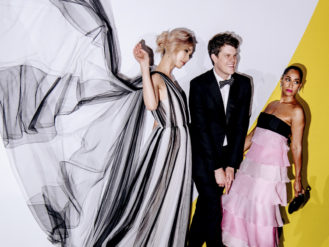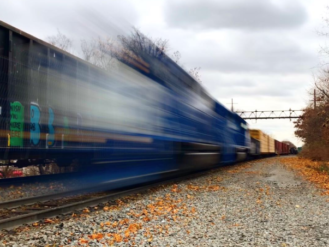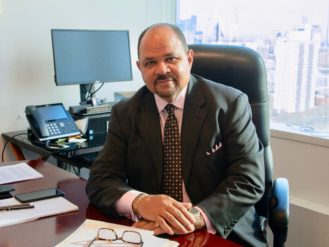Everything Old Is Cool Again: How Retro Companies Thrive
In our thoroughly digital world, these 15 Brooklyn companies do things in a refreshingly analog way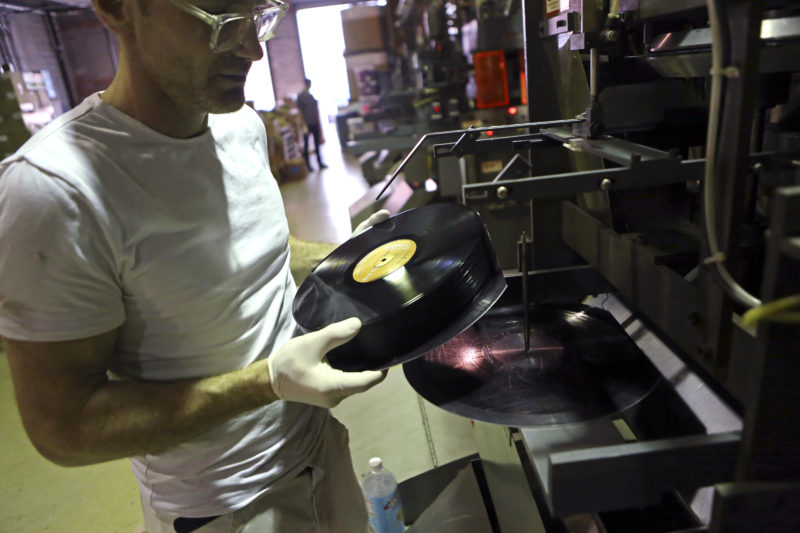
Thomas Bernich, who started Brooklyn Phono in 2000, making vinyl records (Photo by Andrea Mohin/The New York Times/Redux. All other photos courtesy of the companies, except where noted.)
Puppets. Pianos. Pasta. Pinball?
As Brooklyn quickly transforms into a tech hub, it’s more important than ever to chronicle the hundreds of other diverse and thriving businesses in the borough. Sometimes going against the grain can be profitable. As so much of our lives become infiltrated by all things digital, those well-made real things, analog products you can hold in your hand, start to have their own allure.
Here we highlight some of the most unusual, old-school shops in Brooklyn and how they’ve prospered. We asked owners how they manage to keep their shops going, who’s visiting, and much more.
1. Keeping the Fizz Alive
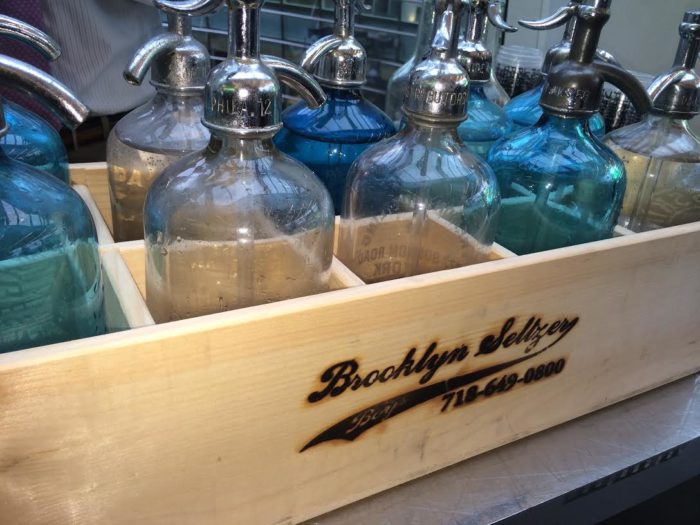
Alex Gomberg’s great-grandfather Moe Gomberg founded Gomberg Seltzer Works in 1953. In 2013, Alex took over the company and added another element: Brooklyn Seltzer Boys. The delivery service drops off and picks up bottles of seltzer that the company bottles in its plant in Canarsie. “We’re a fourth-generation seltzer company and we’re really the last remaining seltzer men,” said Gomberg.
The seltzer is composed of just two ingredients—New York City tap water and carbon dioxide (CO2). There are no chemicals, no salt, no flavoring, and the water is triple-filtered. They’ve been situated in Brooklyn since the very beginning and are currently busier than ever. The Seltzer Boys serve both residential and commercial customers and recently launched a new gift service, the egg-cream kit. The classic New York beverage, which famously contains no eggs, is made of milk, carbonated water and flavored syrup (usually either vanilla or chocolate). You can guess where the Seltzer Boys come in on this one.
2. Who Needs a Phone to Take a Picture?
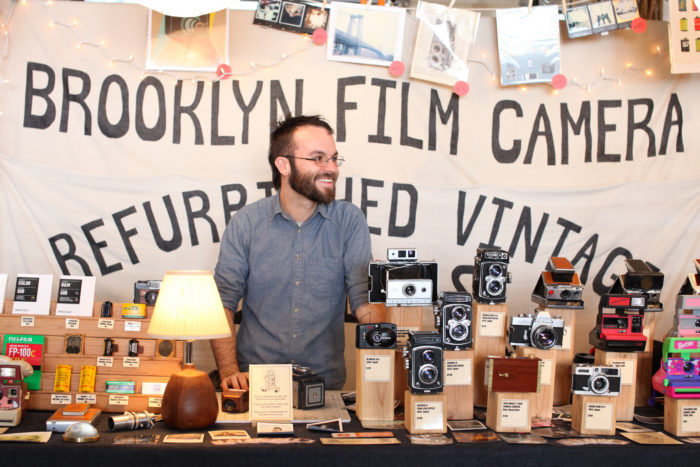
Before starting Brooklyn Film Camera just over three years ago, founder Kyle Depew, above, was a Polaroid employee. His Bushwick-based company primarily specializes in restoring vintage film cameras. Although his customers are primarily based in New York City, the company also has international customers who ship their Polaroid cameras to the store for repair. “We’ve been in Brooklyn since the beginning. There’s more of a demographic here. Although the majority of our business is online, we also have open hours so people can come in and shop,” said Depew.
The camera they’re especially known for restoring? The Polaroid SX-70. “We’re doing great. Film sales have been on a steady increase for about seven years. There’s definitely a steadily growing market for film and cameras,” said Depew. In the world of the iPhone and Snapchat, a certain crowd still loves the classics like the Pentax K1000 and good, old-fashioned Polaroids.
3. Where the Oscars Get Their Golden Garb
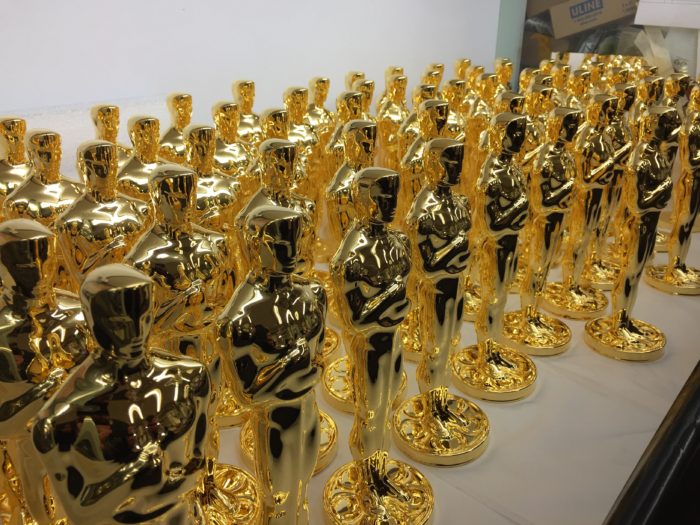
When you see Hollywood stars clutching their Academy Awards in March, here’s a fun fact you can tell your viewing partners: the statuettes got their formal wear in Brooklyn. Yes, the gold plating is applied by Epner Techology of East Williamsburg, which celebrated its 107th birthday last year.
The company started as a jewelry business run by Louis Epner and two partners, who decided to venture into electroplating. They launched the company with $600 worth of gold, financed by one of the partner’s mothers, a caterer. The current president, David Epner, Louis’s grandson, says that the company has gold plated a wide variety of items, from artist Jeff Koons’ balloon rabbits to space-satellite components.
In 2016, the Academy of Motion Picture Arts and Sciences decided to revamp its Oscar statuettes to look more like the classic 1920s versions. The new manufacturer, Polich Tallix, a fine-art foundry in Walden, N.Y., creates the statues and then sends them to Epner, which covers them in 24-karat gold. While electroplating is a classic technique, the company has a proprietary technology called Laser Gold, which it asserts is superior to other methods.
4. Riding the Vinyl Revival Wave
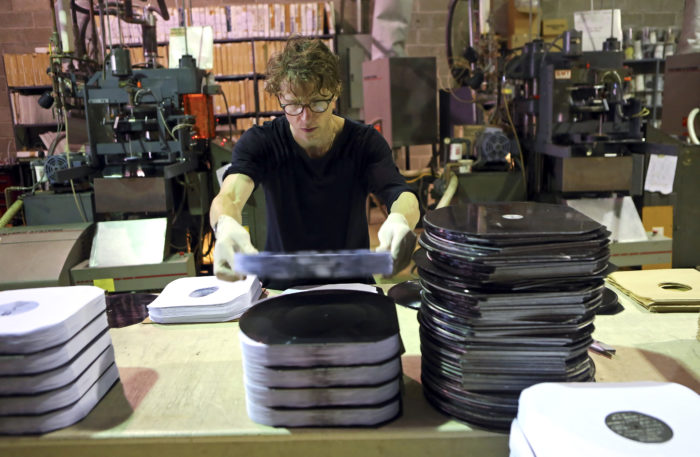
(Photo of record maker Joshua Erb by Andrea Mohin/The New York Times/Redux)
Mastering, plating, pressing, printing, collating, shipping. This is the process that Brooklyn Phono’s records go through. Although music-streaming services like Spotify and SoundCloud have made their mark on the music industry in recent years, there’s a growing community of people who enjoy listening to their music through vinyl records, which tend to produce a richer sound than digital music files.
This is where a company like Brooklyn Phono comes in. Thomas Bernich grew up in Brooklyn in the 1980s and was enamored with music production and mixing. He decided that he was going to start pressing records in 2000. He and his partner bought two record-pressing machines and moved into an office in Sunset Park. When his business partner decided to break away, Bernich’s wife Fern stepped in. The company has pressed records for all types of musicians, including Brooklyn indie favorites Grizzly Bear and the avant-garde Terre Thaemlitz.
5. Fresh Pasta Every Day, Made by Hand
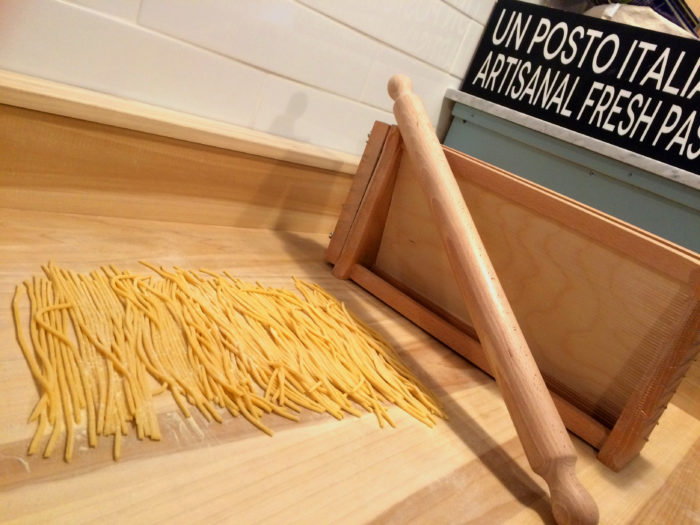
Nestled on Sackett Street in Park Slope, the charming pasta shop Un Posto Italiano is like a miniature Eataly, minus the crowds and ability to get you irredeemably lost. Owner Antonio Capone, who hails from Abruzzo and a family of pasta makers, has been producing small batches of fresh pasta daily since 2015. The small space with an open kitchen is a neighborhood favorite, but people also travel from outer boroughs for the handmade gnocchi and ravioli, homemade sauces, specialty products, and pasta like chitarrina, tagliatella, and spaghetti, always rolled and cut to order for each customer.
The biggest challenge of the business, according to Capone, is maintaining good foot traffic and exposure, “which is becoming more and more difficult for small neighborhood shops like ours in the current highly priced, commercial real-estate market,” he says. But one major perk to owning a Brooklyn business? People actually care. Capone appreciates enthusiastic customers who support shops like his which use “high-quality and locally sourced ingredients with artisanal handmade production methods.” Can’t get more Brooklyn than that.
6. Who Are You Calling a Puppet?
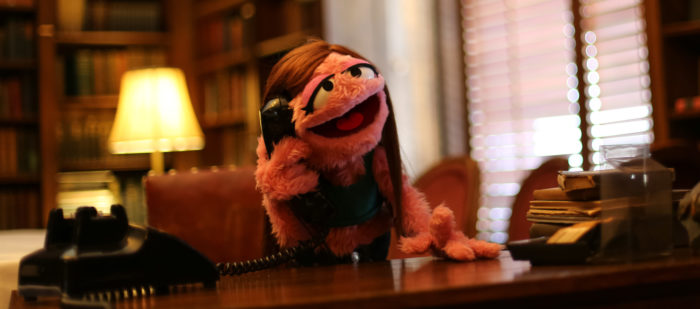
You need puppets? They’ve got puppets. Furry Puppet Studio in Industry City has a deep creative bench with master puppet builders, mechanical engineers, and costume designers dreaming up adorable creatures to be used in TV shows and music videos. Led by founder and creative director Zack Buchman, the modern studio often begins with inspiration for a puppet from a scribble, which turns into a character through the help of 3D printers and handmade fabric.
Recent endeavors range from designing Hillary and Trump puppets for a Mexican satirical TV show to creating a fun iPhone commercial that aired in Japan. Good news for creative folks: They’re looking for a lead conceptual artist to help “expand the way people think about puppets.” Watch a video about the company here.
7. Where Your Piano Goes to Get Its Mojo Back
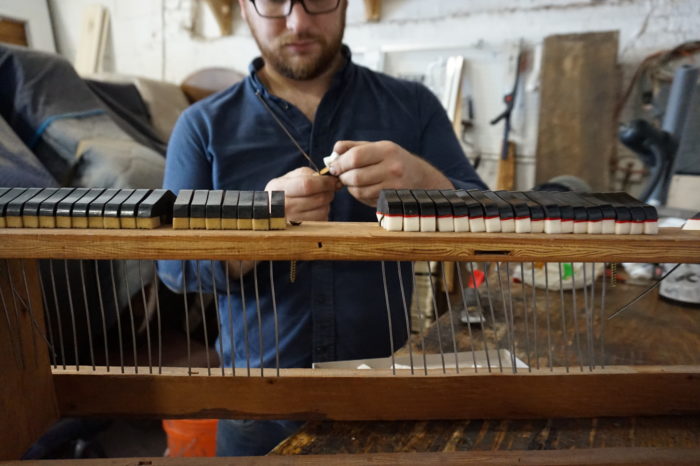
Accoustic pianos may be old school, but that doesn’t mean they’re simple. Underneath those 88 keys are thousands of moving parts, which eventually can get out of whack. That’s where a company like Sunset Park’s Nuernberger Piano comes in.
Timothy Nuernberger founded his small business as a piano tuner and technician in 2013. Since then, it has grown to incorporate other technicians, as well as offering full-scale repairs and restorations. The company has about 800 piano-tuning clients and completes 10 to 12 full restorations each year. The company likes to keep things local, relying on many other Brooklyn-based companies to provide “high-end finishing materials, reclaimed lumber, and specialized tools.” Price of a fully restored 1926 Steinway the company is offering for sale: $59,000.
The company blends the old with the new. “The work we provide uniquely follows the methods and techniques of the 19th-century craftsmen that developed the instruments we service,” says Seth Cotterman, who handles marketing for the company. But customer service is totally up to date, he adds: “We serve our clients in a modern way with fast responses to requests via e-mail, text, phone and engagement on social media.”
8. These Boots Fit Like a Glove
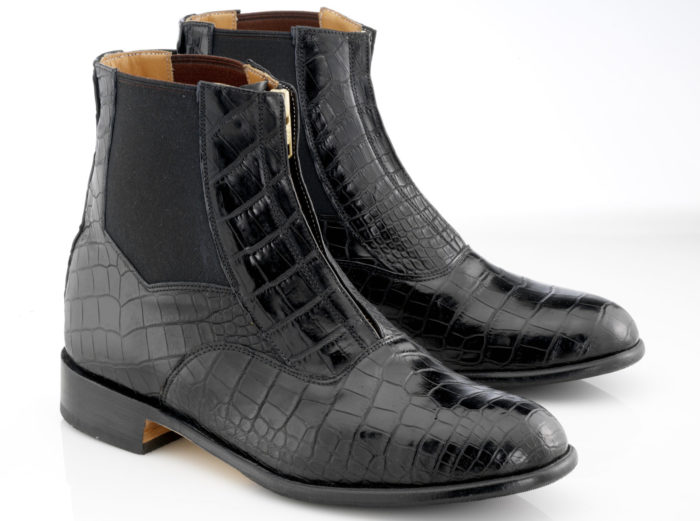
Is it a boot or a work of art? You be the judge. If you’re looking for shoes made with blue snake, pink ostrich, alligator toe caps, or a pair of more traditional riding boots or dress shoes, a team of master craftsmen on McDonald Avenue would be very happy to take your measurements. Der Dau Custom Made Boots & Shoes was founded in 1957 by Jose Der, who brought his Cuban boot-making skills with him when he immigrated to the U.S.
His son Joseph, the shop’s CEO and designer, says he appreciates how working in Brooklyn puts his business at the center of New York City, Long Island and New Jersey, providing a big customer base for the pricey handmade products, which start at around $750 for a pair of oxfords. “Our average customers are celebrities, equestrians, affluent customers with disposable income,” he says, who often travel from other cities for appointments—or he goes to them for personal fittings.
9. A Product of Natural History
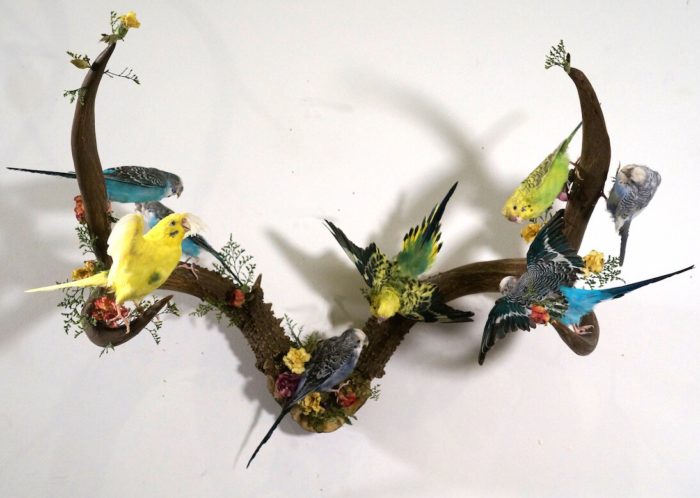
Taxidermy was Divya Anantharaman’s hobby for almost a decade while she worked in fashion, before she turned pro and founded Friends Forever Taxidermy over three years ago. She works out of a studio connected to her home, with a workshop on one level where she does messy sculpture and mold-making work, and another level acts as a showroom where she does her painting and fine detailing.
Business from her clients include requests for film shoots and photo rentals, pet preservation, or small, apartment-sized taxidermy. “A lot of people want to bring a piece of natural history into their home, but want a small piece that makes a nice statement as opposed to something huge and overbearing,” she says.
As far as challenges go, “Aside from the technical skills and artistry to make an animal look alive,” she says, “the hardest part is educating the public that taxidermy is done out of respect for wildlife, and that animals are sourced in a responsible, legal and sustainable way.” Her work takes her out of the borough to art exhibitions and speaking engagements around the country–she’s also co-written Stuffed Animals: A Modern Guide to Taxidermy–and her Instagram feed is a popular and intriguing wonderland of projects, from a mutant butterfly to an Octogoat.
10. An Emporium of Stringed Things
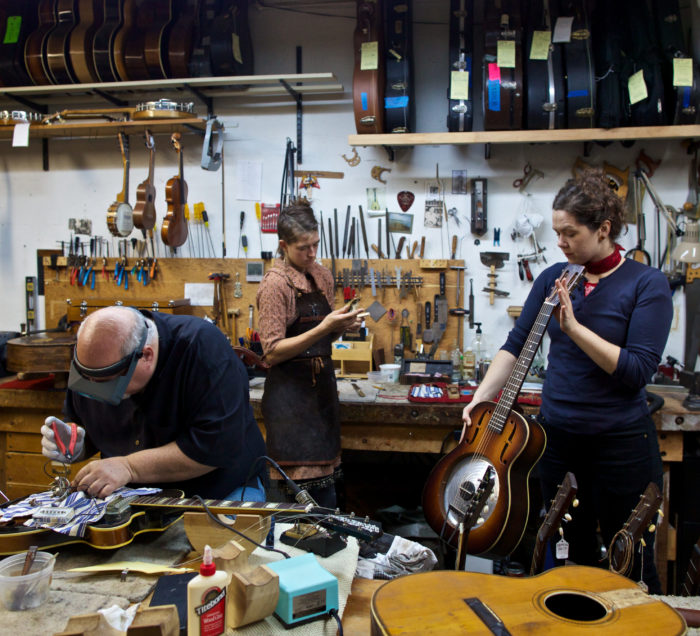
(The RetroFret team at work–from left, Steve Uhrik, Chloe Swantner and Mamie Minch–in a photo by Benjamin Norman/The New York Times/Redux)
Located in Gowanus, RetroFret Vintage Guitars sells and repairs stringed instruments from the familiar to the exotic, including guitars, banjos, mandolins and “a room of electric guitars, where Fenders and Gibsons hang from the walls like so many lacquered lollipops,” as the New York Times put it.
The company was founded in 1983 by Steve Uhrik, a New Yorker who began building guitars in high-school shop class. He went on to work as an assistant violin restorer and in the 1970s, opened a repair shop in SoHo, which later moved to its current location. The store frequently has new items, including many unusual vintage models like the 1910 Stroviols Resophonic Viola, offered for $6,000.
11. Creating on Canvas, Not far from Home
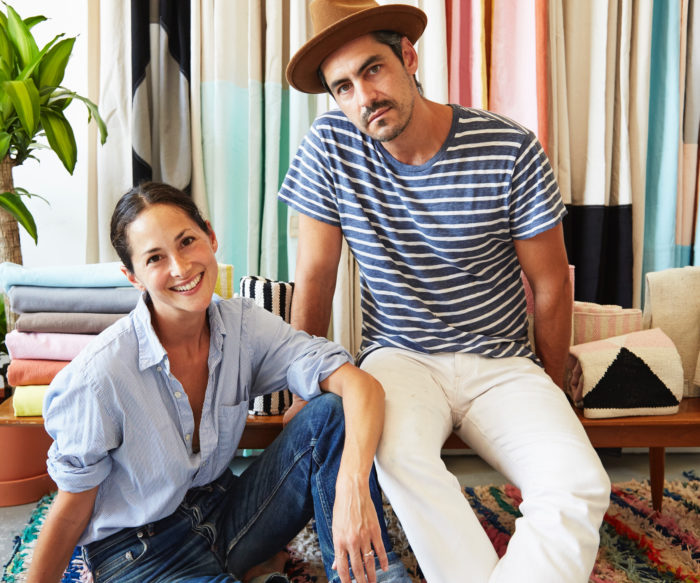
There’s a good reason The Bridge included Quiet Town’s beautiful Marfa Sky shower curtain in our holiday gift guide. Husband-and-wife founders (and Carroll Gardens residents) Michael and Lisa Fine built their company of eye-catching bath accessories in a methodical fashion. All of their 100%-made-in-USA cotton curtains are sewn in Brooklyn, and they work closely with their manufacturer in Sunset Park, dropping by regularly to discuss new products, rush orders, and check on inventory.
Lisa Fine, who’s also the creative director, says producing everything locally eliminates worries about giant manufacturing minimums and lets them experiment with new samples and prototypes. They recently launched an up-cycling campaign called Re:Canvas, which reuses canvas remnants to create limited-edition collections. “We just drive over to our manufacturer and pull remnants for our collaborators,” she says. “It’s really lo-fi and that’s the way we like it.”
Many of their shoppers are from Brooklyn and California. “I think our customers love knowing that we care about our manufacturing process, regardless of it being a Brooklyn-based company or not,” says Fine. “They care, and they know we care, so there’s a sense of community and empathy that we all share for one another.”
12. A Film School With Actual Film
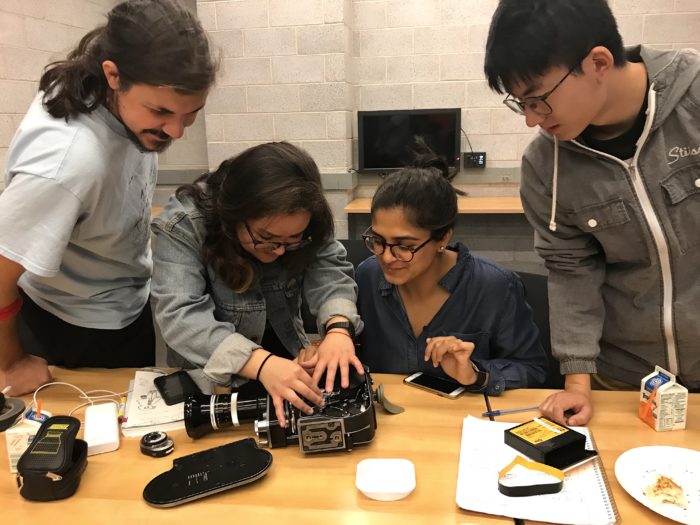
The Mono No Aware film school in Williamsburg teaches its students to film their projects on good, old-fashioned movie film, including Super 8, 16 mm and 35 mm. The school brings in roughly 400 students a year and offers multiple courses, an arts festival every year, screenings, and the opportunity to rent equipment. “You’re never going to take the class and that’ll be the only time you’ll see the equipment. It continues after the class is over,” says founder Steve Cossman.
Cossman, who created Mono No Aware in 2007, is a trained filmmaker and animator who also lectures at Yale and NYU. The organization is a non-profit and stresses social connectivity through cinema. (The name Mono No Aware comes from the Japanese notion of “connection to the ephemeral.”) The school also teaches a free workshop where students learn a non-toxic film processing method the group developed.
13. Race Back into the Slot-car Days of the 1960s
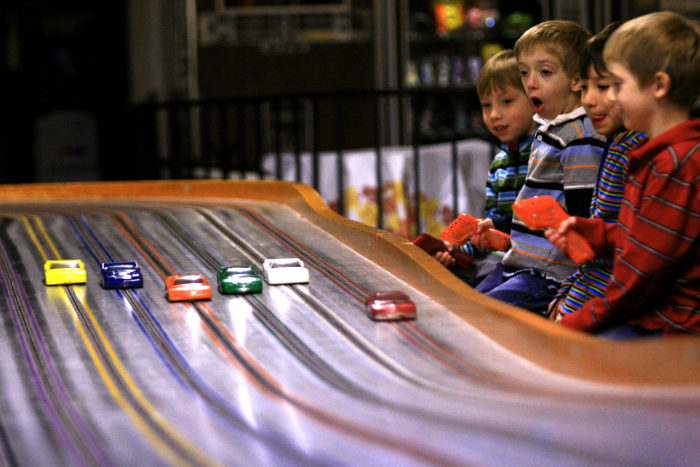
(Buzz-A-Rama photo by Uli Seit/The New York Times/Redux)
They now call themselves “the only place to race in Brooklyn,” but that wasn’t always true. Opened in 1965 by Buzz Perri, Buzz-A-Rama was one of many slot-car arcades operating in New York during the game’s 1960s heyday, but in 1971, Perri has said Buzz-a-Rama became the last arcade standing.
Situated in Kensington, the draw for slot car enthusiasts frequently hosts birthday parties and race competitions between locals. For those who aren’t familiar with mini slot cars, they’re about 7 inches long and 3 inches wide and speed around a track, controlled by participants using hand controls. Buzz-A-Rama closes over the summer but reopens every September—stop by for a blast into the past. Watch them race here.
14. Headphones Made Like Fine Watches
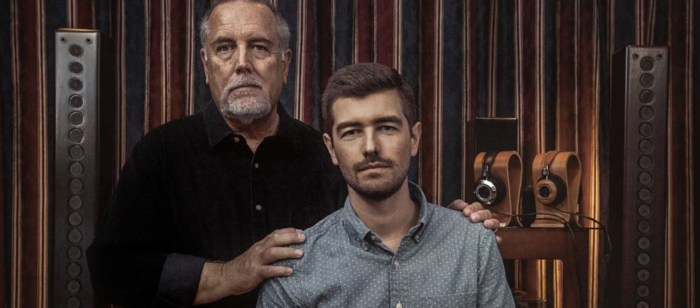
You can go with ear buds or trendy Beats headphones, but if you want a real analog indulgence, check out the hand-made headphones made by Grado Labs in Sunset Park. The products can be pricey: model GS2000e, made partly of mahogany and maple, goes for $1,395. But oh, the sound quality, as the company states: “rich full-bodied vocals, excellent dynamics and an ultra smooth top end.”
The company, founded by Joseph Grado and still in the same family, began making phono cartridges in 1953. The patriarch started to develop the company’s first headphones in the late 1980s and launched the first products in 1990, the same year that Grado’s nephew John took over as CEO. Since then, the company has created more than 60 different types of headphones. John’s son Jonathan, pictured with his father above, joined the company as vice president of marketing in 2013.
This year, the company is set to release its first line of wireless headphones, which doesn’t exactly fit with Grado Lab’s usual old-school techniques, but they’ll be open-back like the company’s traditional design, which allows a bit of outside noise to enter, making for a more natural listening experience.
15. Where to Wash Your Slippers and Hit Your Flippers
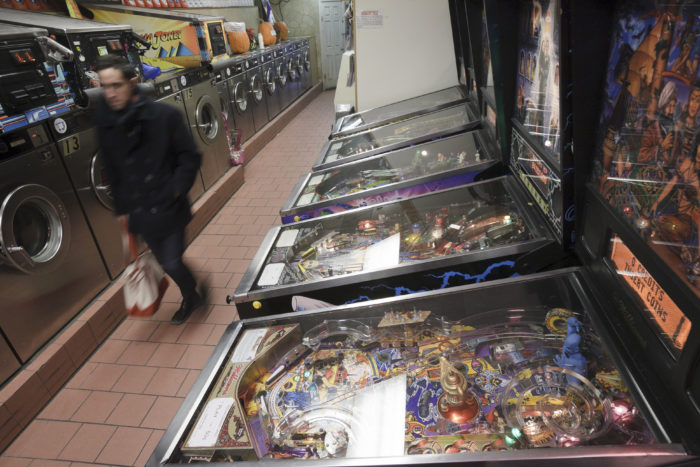
(Sunshine Laundromat photo by Willie Davis/The New York Times/Redux)
Arcade. Laundromat. Art museum. Greenpoint’s Sunshine Laundromat & Pinball is a multi-tasker’s dream. While the front of the business has plenty of washers and dryers and a few pinball machines, the real draw is the “secret” speakeasy-esque dive bar in the back room with plenty more pinball machines, board games, and of course, beer.
The bar addition was created in early 2016, and it’s not just for show: serious pinball leagues compete on the classic machines. Both the laundromat and the bar close at 4 a.m. on Friday and Saturday nights, so you can grab one of the many draft beers while waiting for your whites to dry. Who still repairs pinball machines? You can watch them at work here.





